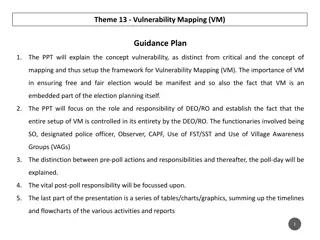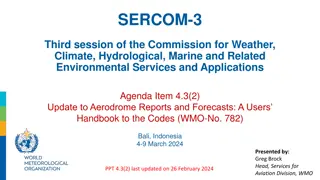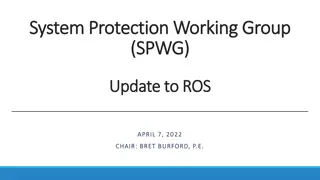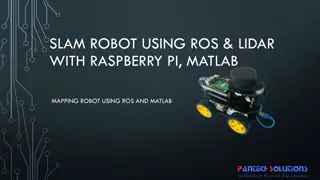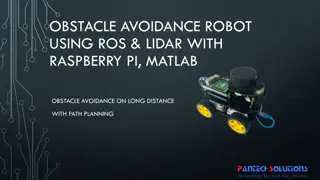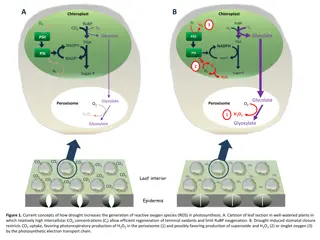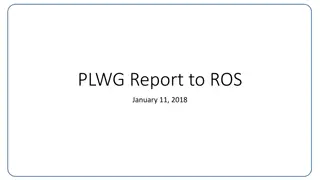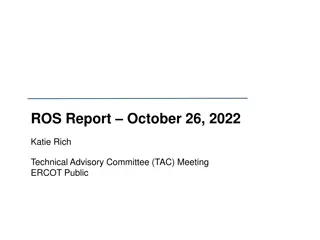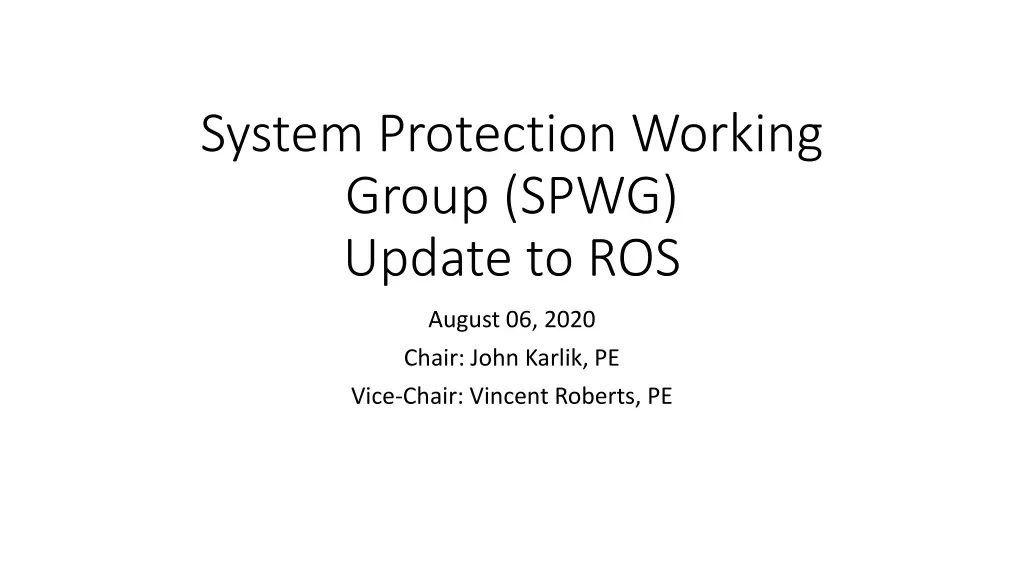
SPWG Update to ROS - System Protection Working Group Meeting Highlights
Stay updated on the latest developments from the System Protection Working Group (SPWG) meeting, including discussions on proposed revisions, impacts of inverter-based resources, and upcoming actions. Explore key insights and future initiatives in grid protection.
Download Presentation

Please find below an Image/Link to download the presentation.
The content on the website is provided AS IS for your information and personal use only. It may not be sold, licensed, or shared on other websites without obtaining consent from the author. If you encounter any issues during the download, it is possible that the publisher has removed the file from their server.
You are allowed to download the files provided on this website for personal or commercial use, subject to the condition that they are used lawfully. All files are the property of their respective owners.
The content on the website is provided AS IS for your information and personal use only. It may not be sold, licensed, or shared on other websites without obtaining consent from the author.
E N D
Presentation Transcript
System Protection Working Group (SPWG) Update to ROS August 06, 2020 Chair: John Karlik, PE Vice-Chair: Vincent Roberts, PE
SPWG Meeting Meeting held on July 22, 2020 Topics Discussed: Proposed NOGRR to revise OG 6.1.5 Impact of Inverter-Based Resources (IBR) on ERCOT Grid Protection Proposed RRGRR 2020 Q1 Protection System Misoperations Next meeting is scheduled November 10-11, 2020
Proposed NOGRR to revise OG 6.1.5 ERCOT presented draft revision of OG 6.1.5 Desire for SPWG to sponsor the NOGRR Proposed language removes annual reporting of DME SPWG tentatively supports changes SPWG is reviewing the draft before submittal
Impact of IBRs on ERCOT Grid Protection
Impact of IBRs on ERCOT Grid Protection SPWG discussed results of TSP survey: A common concern is insufficient modeling data collected during interconnection process Action Items A SPWG workshop to discuss survey results, determine if further action is required, and summarize results to ROS is scheduled for 8/11/2020
Proposed RRGRR SPWG had an action item to revise RARF to add three-winding transformer data Draft changes have been made to the RRG SPWG is reviewing the changes before submittal
2020 Q1 Protection System Misoperations
Protection System Misoperations 2020 Q1 Q1 2020 # of Misoperations Total 24 24 345 kV 10 10 138 kV 14 14 < 100 kV 0 0 By Category Failure to Trip 0 0 Slow Trip 0 0 Unnecessary Trip during Fault 7 7 Unnecessary Trip Non Fault 17 17 SPS 0 0 By Relay System Type Electromechanical 1 1 Solid State 0 0 Microprocessor 20 20 Other/ N/A 3 3 By Equipment Protected Line 8 8 Transformer 2 2 Generator 5 5 Shunt/Series Capacitor 0 0 Shunt/Series Reactor 1 1 Dynamic VAR system 1 1 Bus 3 3 Breaker 4 4
Protection System Misoperations 2020 Q1 Comparison of TO and GO Misoperation Rate 25% TO Misop Rate GO/DP Misop Rate 20% 15% 10% 5% 0% 2015 2016 2017 2018 2019 2020 YTD
Regional Misoperation Rate Comparison Regional Misoperation Rates 18% 16% 14% 12% 10% 8% 6% 4% 2% 0% MRO NPCC RF SERC TRE WECC NERC 2015 Q1 - 2015 Q4 2016 Q1 - 2016 Q4 2017 Q1 - 2017 Q4 2018 Q1 - 2018 Q4 2019 Q1 - 2019 Q4
Protection System Misoperations 2020 Q1 Summary of Human Performance Issues noted for 2020 Q1: - A wind plant tripped off-line due to incorrectly wired CTs in a newly replaced 34.5 kV breaker - A wind plant tripped off-line due to incorrectly wired CTs in a capacitor bank - A 138kV bus tripped due to incorrectly wired CTs from a distribution transformer during a construction project Failure to Trip/Slow Trip Misoperations in 2020 Q1: - None
Definitions Protection System Protective relays which respond to electrical quantities, Communications systems necessary for correct operation of protective functions Voltage and current sensing devices providing inputs to protective relays, Station dc supply associated with protective functions (including station batteries, battery chargers, and non-battery- based dc supply), and Control circuitry associated with protective functions through the trip coil(s) of the circuit breakers or other interrupting devices
Definitions Composite Protection System - The total complement of Protection System(s) that function collectively to protect an Element. Backup protection provided by a different Element s Protection System(s) is excluded. Misoperation The failure a Composite Protection System to operate as intended for protection purposes. Any of the following is a Misoperation: 1. Failure to Trip During Fault A failure of a Composite Protection system to operate for a Fault condition for which it is designed. 2. Failure to Trip Other than Fault - A failure of a Composite Protection system to operate for a non-Fault condition for which it is designed, such as a power swing, undervoltage, overexcitation, or loss of excitation.
Definitions Misoperation The failure a Composite Protection System to operate as intended for protection purposes. Any of the following is a Misoperation: 3. Slow Trip During Fault A Composite Protection system that is slower than required for a Fault condition if the duration of its operating time resulted in the operation of at least one other Element s Composite Protection System. 4. Slow Trip Other than Fault - A Composite Protection system that is slower than required for a non-Fault condition, such as a power swing, undervoltage, overexcitation, or loss of excitation, if the duration of its operating time resulted in the operation of at least one other Element s Composite Protection System.
Definitions Misoperation The failure a Composite Protection System to operate as intended for protection purposes. Any of the following is a Misoperation: 5. Unnecessary Trip During Fault An unnecessary Composite Protection system operation for a Fault condition on another Element. 6. Unnecessary Trip Other than Fault - An unnecessary Composite Protection system operation for a non-Fault condition. A Composite Protection System operation that is caused by personnel during on-site maintenance, testing, inspection, construction, or commissioning activities is not a Misoperation.


